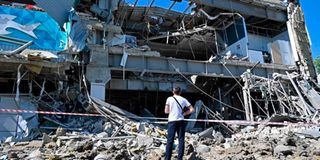Premium
Culture in the time of war: You can’t stop reggae

A man looks at a supermarket, partially destroyed by a missile attack in the Ukrainian city of Kharkiv on June 8, 2022. Theatre and opera attendance has never been higher in the Ukraine capital Kyiv, that was itself attacked on December 29, 2023.
It is two years since Russia invaded its neighbor Ukraine in an aggressive all-out war of intended conquest and annihilation.
As you read this, there are Shahad drones over Dnipro, shelling in Sumy, blasts in Kherson Oblast, missiles striking Odessa, machine-gunning in Zaporizhzhia, and constant Russian shelling of Kherson. Yet the Ukrainian defenders hold out.
And theatre and opera attendance has never been higher in the capital Kyiv (that was itself attacked on December 29,2023, with Russian drones killing 55 souls), or the libraries fuller, in a nation that boasts 99 per cent literacy levels.
To come to Kenya, Anastasiia ‘Nastya’ Kapranova, the young Program Manager for the Ukraine Institute (she’s in charge of Kenya, Nigeria and South Africa) under the Ministry of Foreign Affairs, took the train to Warsaw, then flew into the country. The air space over Ukraine is closed.
But Anastasiia is here in Kenya to initiate the opening of a Ukrainian Institute of Culture within the year if possible, because “war cannot stop art, or (Russian) bullets stop the performance of ballet”.
The most active foreign cultural institutes in Kenya are currently the Goethe Institute and Alliance Francaise.
Anastasiia rues the ‘Russification’ of her nation for so many decades, although Ukraine is a new sovereign, only having been independent since 1991 (after the fall of the Soviet Union), although ‘Putin now wishes to put us back into the ‘Russian Empire’,’ something Anastasiia, like so many Ukrainians, vows will never happen.
North Korean ballistic missiles
We are seated in the garden of the Radisson Blu next to the Arboretum, the serene environment a far cry from the conflict in Ukraine, and Anastasiia shows great cheer, resilience and optimism as she explains what Ukrainian culture is.
“It is our gold-domed churches and our vyshyvanka (embroidered blouses). It is krashenka (colourful eggs) at Easter, a spirit of warmth and famed hospitality.”
In Ukraine, it is customary to carry flowers, chocolate and a bottle of liquor on home visits.
Anastasiia agrees that it is Russian writers like Tolstoy and musicians like Tchaikovsky, that the world knew.
“But Nikolai Golgol was Ukrainian. And we have world renown writers like Oksana Zabuzhko (Field Studies of Ukrainian Sex) and youngsters like poet and novelist Andriy Lyubka, 36, who is very well known and regarded with books like Carbide.”
For me, listening to ‘Super Blonde” Olya Polyakova on YouTube, described as the Lady Gaga of Ukraine, is a treat.
Russia may sometimes attack their capital Kyiv with North Korean ballistic missiles, but the bards and ballads of Ukraine keep defying this badass, including with ballets within its blasted ballasts.
Ms Kapranova condemns the fact that the Russian invaders deliberately target Ukrainian museums, monuments, musical houses, libraries and even theatres, in “an attempt to wipe out our culture, after trying to wipe out our identity in the Soviet times.”
She is proud that since the illegal annexation of the Crimea by Russia in 2014, a ‘whole new generation of Ukrainians have dropped Russian, and taken up their mother tongue/ national language; that’s a win!’
PEN Ukraine continues to document the death of cultural figures in this brutal war.
In January, three of the prominent deaths were of the musician and soldier Volodymyr Fedinchuk on the Donetsk frontline in Eastern Ukraine, iconic actress Victoria Tymoshenko, 84, of heart attack brought on by bombing in Kharkiv, and the death of serviceman and poet Maksym Krystov, who wrote Virshi z biynytsi (Poems from the Battlement).
- Mr Mochama is a poet, novelist and the PEN International (Kenya) Secretary-General; [email protected]


